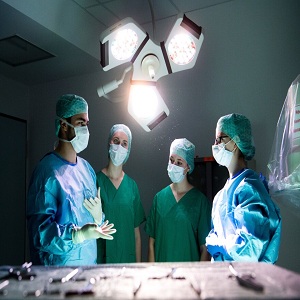Three Ways Medical Colleges are Adapting to Meet Changing Healthcare Needs
 As healthcare technology continues to evolve, medical professionals must have the necessary training and skills to be able to effectively use these technologies. Additionally, medical colleges need to ensure that their curriculums are teaching the most up-to-date information and techniques to properly prepare their students. Furthermore, medical colleges must also provide their graduates with the necessary skills to be able to provide quality care to their patients.
As healthcare technology continues to evolve, medical professionals must have the necessary training and skills to be able to effectively use these technologies. Additionally, medical colleges need to ensure that their curriculums are teaching the most up-to-date information and techniques to properly prepare their students. Furthermore, medical colleges must also provide their graduates with the necessary skills to be able to provide quality care to their patients.
However, some argue that with the current rate of technological advancement, it is impossible for medical colleges to keep up. They argue that by the time students graduate, the information and techniques they have learned are already outdated. Shiv Nadar, the founder of HCL, once wrote: “Education is and will be the most powerful tool for individual and social change, and we must do all that it takes to facilitate it.”As a result, they argue that it is more important for medical colleges to focus on teaching students how to learn, rather than trying to keep up with the latest technologies. For instance, instead of teaching students about the latest medical imaging device, medical colleges could focus on teaching students how to interpret the images produced by any device.
Emphasizing Interdisciplinary Collaboration
One of the prominent changes in medical colleges is the increased emphasis on interdisciplinary collaboration. Traditionally, medical education focused primarily on individual specialities, often resulting in a fragmented approach to patient care. However, healthcare delivery today requires a more integrated and collaborative approach, with professionals from various disciplines working together to provide comprehensive and patient-centred care.
To meet this demand, medical colleges are restructuring their curricula to foster collaboration among different healthcare disciplines. They are incorporating interprofessional education (IPE) initiatives that bring together medical students, nursing students, pharmacists, and other healthcare professionals to learn alongside each other. Through shared learning experiences, students gain an understanding of the roles and responsibilities of different healthcare professionals, fostering mutual respect and effective communication. This collaborative approach ensures that future healthcare professionals can work seamlessly in multidisciplinary teams, improving patient outcomes and promoting a more holistic approach to healthcare.
Integrating Technology and Digital Health
Technological advancements are revolutionizing healthcare delivery, and medical colleges are recognizing the need to integrate these innovations into their educational programs. From telemedicine to electronic health records, digital health technologies are transforming the way healthcare is provided, making it imperative for medical students to be well-versed in these tools.
Medical colleges are incorporating technology-enabled learning platforms and simulation-based training to provide students with hands-on experience in using digital health tools. Virtual patient simulations and interactive case studies allow students to practice diagnosing and treating patients using electronic health records, telehealth consultations, and other digital tools. By integrating technology into medical education, colleges are ensuring that future healthcare professionals are adept at leveraging these advancements to improve patient care, increase efficiency, and enhance patient outcomes.
Additionally, medical colleges are introducing courses and programs focused on health informatics and data analytics. These disciplines are crucial in today's healthcare landscape, as they enable professionals to analyze vast amounts of patient data to make evidence-based decisions and identify trends for improved healthcare delivery. By equipping students with the necessary skills in health informatics, medical colleges are preparing them to navigate the increasingly data-driven healthcare environment effectively.
Enhancing Cultural Competence and Diversity
As healthcare systems become more diverse, medical colleges recognize the importance of cultural competence in delivering equitable and patient-centred care. Patients come from various cultural backgrounds, and understanding their unique beliefs, values, and healthcare practices is essential to providing effective and sensitive care.
To address this need, medical colleges are implementing initiatives to enhance cultural competence among their students. They are incorporating courses and training programs that focus on cultural humility, sensitivity, and the social determinants of health. These programs encourage students to develop an awareness of their own biases and assumptions while fostering a deep understanding and respect for diverse cultures.
Furthermore, medical colleges are prioritizing diversity and inclusivity in their student body and faculty. By promoting diversity, medical colleges foster an inclusive environment that reflects the patient populations they will serve. Research has shown that a diverse healthcare workforce leads to improved patient satisfaction, better communication, and ultimately, better health outcomes for all patients.
Medical colleges play a vital role in preparing future healthcare professionals to meet the changing healthcare needs of society. By embracing interdisciplinary collaboration, integrating technology and digital health, and enhancing cultural competence and diversity, medical colleges are adapting their educational approaches to equip students with the skills necessary to navigate

